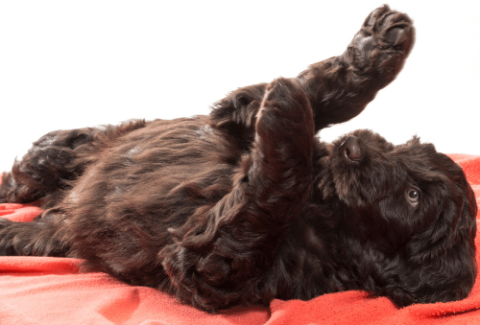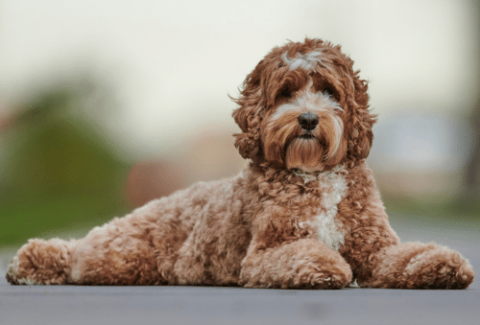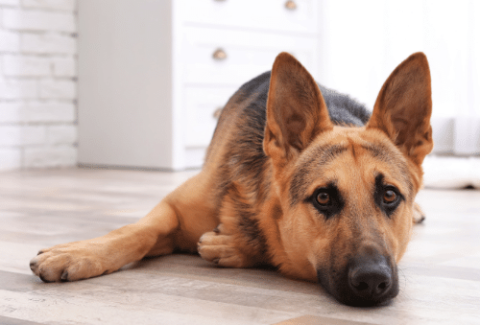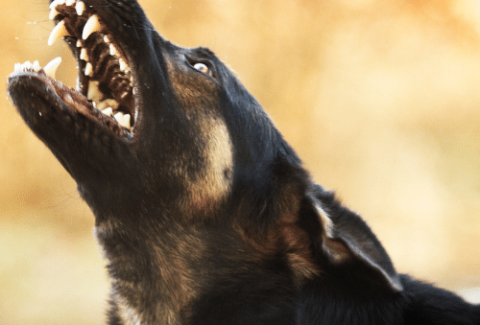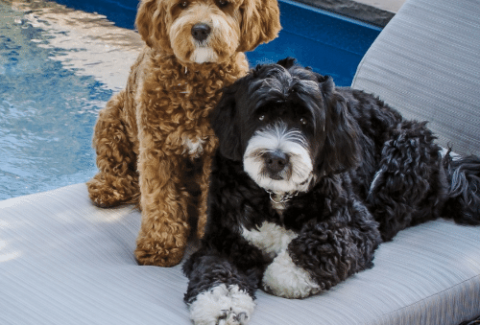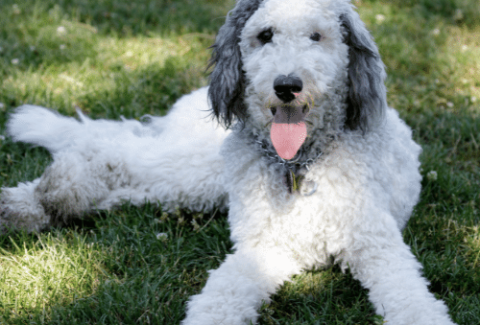Are Sheepadoodles Aggressive?
July 11, 2021 2021-08-06 8:21Are Sheepadoodles Aggressive?
Doodle hybrids have becoming increasing popular over the last few years. They are one of the most popular “designer” breeds. A doodle is simply some sort of mixed breed that includes a Poodle as one of their parents. Particularly, Sheepadoodles are a mix between a Poodle and an Old English Sheepdog.
When you mix two breeds together, you never exactly know what you’re going to get. Unlike purebred dogs, mixed breeds vary significantly since they are inheriting from a wide gene pool. When there are more traits available for the dog to inherit, you’re bound to end up with more varied dogs.
If socialized properly, the Sheepadoodle usually isn’t aggressive. They aren’t the friendliest dog around. In general, they seem to a bit aloof with strangers and somewhat untrusting. They are very devoted and friendly with their people, but usually take longer to warm up to new people.
However, this aloof nature doesn’t necessarily make them aggressive. They aren’t more likely to bite than any other dogs. But socialization is important. If your canine is not introduced to a wide variety of people at a young age, then they may be particularly fearful, which can cause aggression.
Table of Contents
How Aggressive are Sheepadoodles?
All Sheepadoodles are going to be somewhat less friendly than other dogs. These canines are not Golden Retrievers. They are not going to be instant friends with everyone that they see. With that said, they are very friendly with their people. They are cuddly and devoted to their family, though this doesn’t easily extend to strangers.
Generally, a properly socialized Sheepadoodle isn’t going to be any more aggressive than your average dog. Of course, if you don’t socialize them at all, they will be more prone to aggression. Socialization is essential and has a stronger affect on your dog’s temperament than genes. Genetics do play a significant role, but they can often be counteracted with the right socialization.
Overall, Sheepadoodles fall about in the middle as far as friendliness and aggression are concerned. They aren’t the friendliest breed, but they aren’t particularly aggressive either. Most will treat strangers with a respectful aloofness and mind their own business. (If you’re looking for a dog that will leave your guests alone when they walk in the door, this breed is a good option.)
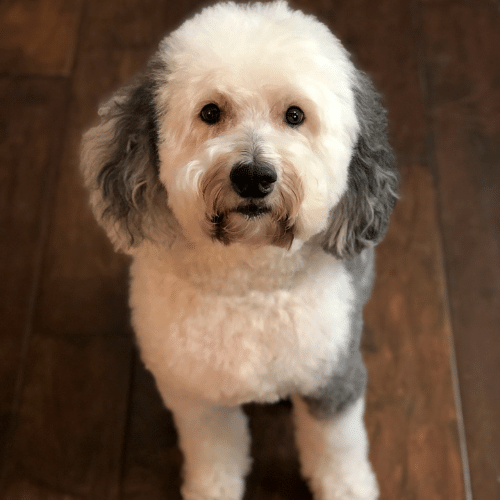
How Can You Prevent Sheepadoodle Aggression?
There are many ways that you can counteract aggression in a dog. If you have a new puppy, it is important to follow some of these guidelines to avoid aggression problems later on. Most behavioral problems can be counteracted, especially if you begin at a younger age.
With these dogs, you never know what traits they’re going to inherit. Some of them may be more prone to aggression than others. Since you don’t know what you’re going to get, it is best to assume that your dog will need lots of socialization. You can’t really over socialize or train a dog, so is it best to err on the side of more.
Socialization
Socialization is one of the most important parts of training a puppy. While most people know that their dog needs to learn things like “sit” and “stay,” socialization is often overlooked. However, taking your dog out to meet different people and experiencing different things is essential for avoiding fear-based behavioral problems later. Lots of aggressive behavior is actually caused by fear. The dog is scared of the new person or dog and then becomes aggressive in an attempt to protect themselves.
Socialization is fairly easy to achieve. You simply need to take your dog to lots of different places at a young age so that there are very few new things they might see once they are older. Show them different dogs and people. Take them to different places. There are many things that are completely normal to us that may cause fear in your dog. By showing them, plenty of different sights and sounds at a young age, you’re avoiding some of this fear.
Look for different places in your community that provide your dog with appropriate socialization. The pet store is often a great option, as they are typically pet-friendly. There are usually lots of dog-lovers and other canines here that will happily meet and greet with your puppy. Look for places like dog parks and consider taking your dog to puppy classes as well.
Some owners do not socialize their dogs sufficiently on purpose in order to create a “sharp” dog”. This is a dangerous practice and you should absolutely refrain from doing it. Sheepadoodles are not ideal guard dogs, and you cannot create a protective dog simply by under-socializing.
Exercise
When dogs don’t get enough exercise, they will often begin to exhibit problematic behavior. A dog that doesn’t get enough exercise may be a bit hyperactive. This can indirectly lead to aggressive behavior. Your dog may be more likely to chase other animals and people, for instance, if they haven’t received enough exercise. Most other dogs will not like being chased and may interpret this as aggressive behavior.
These dogs are very intelligent. While they do need physical exercise, they also need mental exercise. If you don’t provide your dog with enough opportunities to entertain themselves, they will likely decide to go make their own fun – which typically includes things you don’t want them to do.

What Causes Aggression in Sheepadoodles?
Dogs are not simply born aggressive. Usually, there is an underlying cause of aggression in dogs. They aren’t just being aggressive because they can be.
Neglect
If your dog isn’t well-taken care of, they may become aggressive. Many dogs with serious needs (like food or thirst) will feel a need to go out and secure the resources to meet these needs. This will often lead to aggression. Dogs often fight over water and food when they don’t have enough of these things.
Even after the food and water situation has been corrected, some dogs may still feel like there is a shortage. This is what leads to guarding far after the neglect situation has been corrected.
New Situations
Some dogs may become fearful in new situations. This is one reason why socialization is so important. It reduces the number of new situations your dog might encounter. You don’t want having visitors over to your home as something “new.”
It is best to take any new situations slowly at first to prevent possible aggression.
This especially applies to small children. Many owners like to get Sheepadoodles as family dogs and neglect to introduce them to their kids in a slow and careful manner. Cornered by kids and without a way out of the situation, even a well-mannered Sheepadoodle might snap.
Pain
Many dogs that are otherwise laidback may become aggressive when they are in pain. These dogs may be completely well-behaved otherwise, and then suddenly snap at their beloved owners. Often, sick dogs don’t want to be touched and can’t simply get up and move away. Therefore, the only way they can tell their owner not to touch them is to become aggressive.
The dog may not show any other sign of sickness besides the sudden aggression. If your dog suddenly becomes aggressive, consider taking them to the vet.
Conclusion
Overall, Sheepadoodles aren’t any more aggressive than your average dog. They aren’t as friendly, but this doesn’t mean that they are automatically more aggressive. In most cases, they simply prefer to cuddle with their family members over strangers.
Just like any dog though, if you don’t socialize and care for your Sheepadoodle, they may easily become aggressive. Most dogs become aggressive due to fear, which usually arises from strange situation. If you dog is socialized properly, there won’t be many new things for them to encounter, which will reduce the odds of them exhibiting fear-based aggression.

Author: Kristin
Kristin was born in Tennessee and currently lives there with her husband and children. She is passionate about educating pet parents and helping them make the best possible decisions for their pets. She currently owns one dog, two cats, a lizard, and a variety of fish.
Steffi Trott
Related Posts
Are Labradoodles High-Maintenance?
At what age do Labradoodles calm down?
Are Pomeranians Good for First-Time Dog Owners?
Are German Shepherds Hypoallergenic?
Are German Shepherds Smart?
Are German Shepherds Vocal?
Are German Shepherds Good With Kids?
Do Bernedoodles like Water?
Do Bernedoodles Like Cats?
How Long Can Australian Shepherds Be Left Alone?
Check out our effective and affordable online dog training courses!
-
Sale Product on sale
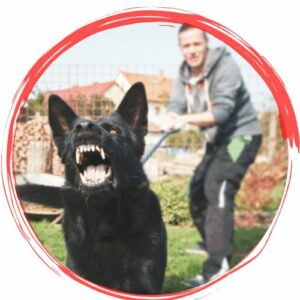 Tackling Reactivity Bundle
Tackling Reactivity Bundle
MONEY BACK GUARANTEE$564.00$49.00 -
Sale Product on sale
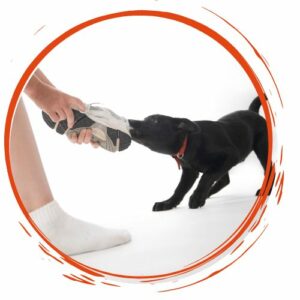 Perfect Obedience Bundle
Perfect Obedience Bundle
MONEY BACK GUARANTEE$349.00$49.00 -
Sale Product on sale
 Ultimate Puppy Bundle
Ultimate Puppy Bundle
MONEY BACK GUARANTEE$416.00$49.00 -
Sale Product on sale
 The Perfect Focus Bundle
The Perfect Focus Bundle
MONEY BACK GUARANTEE$445.00$169.00 -
Sale Product on sale
 Ultimate Masterclass Bundle
Ultimate Masterclass Bundle
MONEY BACK GUARANTEE$2,213.00$499.00

